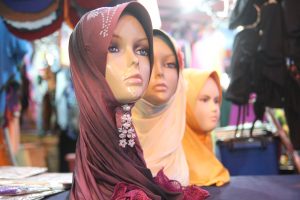Under Taliban rule of Afghanistan in the late 1990s, the hardline Islamic militia weaponized the burqa, turning the head-to-toe covering — often referred to in the mainstream media as a potato sack for women — into a symbol of oppression and control.
The burqa was taxed, costing more than an average month’s wage of about $30, so women were forced to share. Thus only one woman could afford to leave the home at any given time, and always accompanied by a male relative.
But the burqa had its supporters, who argued the overall with veiled holes was a status symbol for the middle classes. It protected women from the sun.
They had whiter skin and this helped to differentiate them from the peasantry whose skin was darker from years of toil in the fields.
Their decision, these supporters claimed, was based on choice.
But old arguments die hard, and 20 years later, hardliners in Malaysia are again demanding that Islamic women wear a hijab or tudung, which closely resembles a burqa, to satisfy their designs on female fashion.
Malaysia does not warrant comparisons with Afghanistan. It is a modern nation where women hold senior positions in the judiciary, the cabinet and international business.
Traditionally, Malaysian Muslims have followed a moderate form of Islam. Many are happy to wear the tudung, covering the neck, head and face if required, but it is not mandatory under law.
But the advance of shariah law in parts of Malaysia and a rising Islamic conservatism have unnerved many, including the writer and activist Maryam Lee, who recently made a name for herself as a social reformer.
She argues that wearing a tudung should simply be a matter of choice.
“The real problem here is that Islam has become an instrument of power and control by Malay Muslim men,” she told The Diplomat.
“Any deviation or challenge to this is considered a criminal offense, resulting in consequences that escape their imagination because they don’t even allow women’s voices/perspectives to be heard at the decision-making level.”
Her new book “Unveiling Choice” deals with just that, and as one critic wrote, Maryam is a woman “who agonized long and hard on the subjects that courted her her undeserved infamy.”
“Until today, we still inherently believe that women can never become ulamas or imams, because leadership roles are deemed exclusive to men,” Maryam said.
“A lot of fatwas would be very different if women were actually given the opportunity to govern our own bodies,” she said, adding this would not be favorable for men in power.
Muslims make up about 61 percent of Malaysia’s population, an absolute majority but still a long way short of the numbers necessary to call itself an Islamic republic as the Taliban once did. Christians, Hindus and Buddhists all make up sizable minorities.
Yet, with conservative Islam on the rise across Malaysia, Muslims are increasingly exposed to interpretations of shariah law in addition to the regular laws of the country.
“I don’t think conservatism is even the right word to use here,” Maryam said.
“There is nothing wrong with ‘conservatism’ per se, what’s wrong is when these values are considered immutable in the eyes of the law, and the possibility of criminalization when we ‘stray away’ from these values.”
Shariah courts can jail, fine and impose the lash for violations of Islamic law, with investigations often launched from the Islamic Affairs Department in the central state of Selangor.
Public pressure is intense. Malaysian entertainers, sports stars and rights activists are often bullied for de-hijabing. The singer Zizi Kirana recently asked
Maryam is also under investigation, initially for holding a public forum on the subject and again following the release of her book. The reasons were the same: potentially insulting Islam.
“Malaysian Muslims are unfortunately subjected to arbitrary rules like this due to our dual legal system,” she said, adding that Muslims should be allowed to opt-out of the Shariah legal system.
She said there was no end date for such investigations, which can be re-opened whenever the religious authorities see fit, “even if it’s 10 or 20 years down the road.”
“When women are not at places where we can make laws and policies, society diverts — visually and socially — further and further away from the idea that women have just as much rights as men.
“This ‘invisible’ effect on women is hard to measure, particularly in the economic sense, but I am sure it is not too difficult to imagine how this can be destructive,” she said.
If only Malaysia’s Islamic hardliners could see it that way.
Luke Hunt can be followed on Twitter @lukeanthonyhunt













